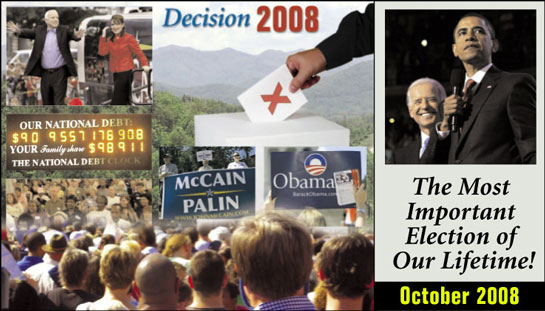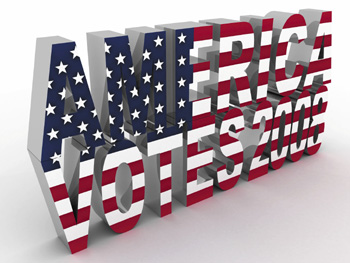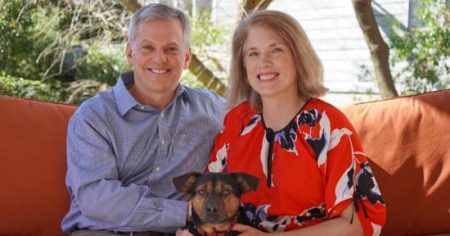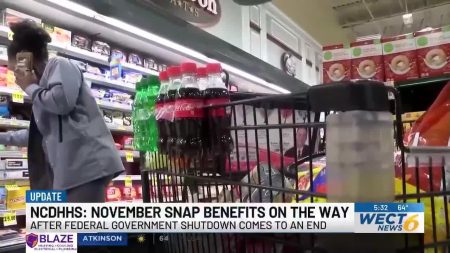Decision 2008 – November 4

 Vote early any time between October 16 and November 1
Vote early any time between October 16 and November 1
from Staff reports
What’s on the ballot this year?
The big event in 2008 voting is, of course, the presidential race, in which, for the first time, an African American is the presidential candidate of one of the major parties and a woman is the vice-presidential candidate for the Republicans.
Illinois Senator Barack Obama leads the Democratic ticket with his running mate, Delaware Senator Joe Biden, and his candidacy has brought the presidency within reach of someone other than a white male for the first time since George Washington was chosen for the office 220 years ago.
The Republican party has nominated 72-year-old Senator John McCain of Arizona for president and Alaska Governor Sarah Palin, a newcomer to national politics, for vice-president.
Age, race, sex, plus a Libertarian
The presidential election will be historic no matter who wins,
given that either the oldest man and the first woman, or the first
African American man, will take office in January.
Several factors have helped the presidential campaign eclipse most
other races: two ongoing mid-east wars and what the current
administration calls GWOT, or the Global War On Terror; the collapse of
major parts of the economic system ranging from Wall Street
institutions to the entire US housing market; Obama’s unexpected
emergence and victory over Senator Hillary Clinton in the Democratic
primaries last spring; and McCain’s choice of the unknown, untested
Palin to be his running mate. Obama is also the first Democrat who,
according to some polls, has a chance of winning North Carolina’s 15
electoral votes since Jimmy Carter won the state in 1976.
McCain and Obama are almost diametrically opposed on most issues of
importance to voters this year. On the economy and taxes, health care,
environmental protection, military action, civil liberties, energy, and
education, the two candidates and their party platforms offer a study
in contrasts.
Most of the differences can be seen by a visit to the two campaigns’
websites: www.johnmccain.com and www.barackobama.com. Here are outlines
of two areas in which the candidates differ:
Economy & Taxes: Obama has been an advocate for many years of
strict regulation of banks and other investment corporations, and has
long called for a restructuring of tax laws that encourage corporations
and individuals to move money and jobs overseas at the expense of
Americans. He has opposed the tax cuts for the wealthy and corporations
and special tax breaks for big oil that have been promoted and
implemented by the Bush Administration. He calls for increased taxes
for large corporations and for families and individuals making more
than $250,000 a year, and lower rates for everyone else.
McCain has been an avid deregulator for more than 20 years, strongly
supporting the Gramm-Leach-Bliley act of 1999, which repealed the
Depression-era Glass-Steagall laws that had been enacted in 1933 to
protect the public from dishonest banking practices.
In the 1980s, Savings & Loan associations chafed under tight
regulations, as did big investment banks in the 1990s, and Lincoln
Savings executive Charles Keating convinced McCain and four other
senators (the “Keating Five”) to intervene with regulators for almost
two years in order to avoid the consequences of overlending. The
collapse of Lincoln and other S&Ls in 1988-89 cost taxpayers almost
$125 billion.
In the aftermath of the current housing/banking crisis, in which
history is repeating itself, McCain has reversed course and now calls
for tighter regulation.
McCain opposed Bush’s original tax cut program in 2001, calling it a
giveaway to the rich. By 2003 he switched positions and since then has
supported virtually all of the Administration’s tax programs. He wants
the current tax rates, including the lower rates for the wealthiest
individuals, to be made permanent.
Health Care: Obama promotes a national health care program that would
enable individuals, families, and small businesses to buy insurance
across state lines and create pools of insured to negotiate rates. He
also would provide government subsidies to help those who cannot afford
insurance on their own.
Under current law (for generations), health insurance provided by
businesses to employees is a tax-deductible expense for the business
and a tax-free benefit for the employee. McCain’s plan would reverse
that arrangement, forcing families to pay taxes on any “free” insurance
they receive from their employer, and making it more expensive (without
tax-deductibility) for companies to offer.
The idea is to encourage companies to stop providing insurance, so that
families will have to buy it themselves on the open market. In exchange
for their higher tax liability, McCain would provide a tax credit to
families that buy insurance, and which would be paid directly to the
insurance company. Any difference in cost between the insurance
available for the credit amount and the actual coverage would have to
be made up by the taxpaying family. In his own words, McCain wants to
deregulate the health insurance market “the same way we’ve deregulated
banking.”
Other candidates
Also on the presidential ballot in North Carolina is Libertarian Bob
Barr, a former Republican Congressman from Georgia. Neither Texas
Congressman Ron Paul nor consumer activist Ralph Nader, both running as
independents, will appear on the N.C. ballot, though Nader is on the
ballot in 45 states.
There are also other races on the ballot, and they might matter to
North Carolina residents as much as, or more than, who wins the White
House November 4.
U.S. Congress
One of North Carolina’s two Senate seats is up for grabs in a hotly
contested race between incumbent Elizabeth Dole and former State
Senator Kay Hagen. Both women are fighting a fierce, mostly negative
television battle to sway voters; whoever wins could help a new
president develop and implement new policies or thwart him in trying to
bring about change from the current dysfunction that is Washington. The
third candidate is Christopher Cole, a Libertarian, though his
candidacy has had little if any impact on the race.
In the 11th Congressional District, first-term Democratic Congressman
Heath Shuler is defending his seat from two challengers, Republican
City Councilman Carl Mumpower of Asheville and Libertarian Keith Smith
of Bostic.
In the largely conservative district, Shuler has positioned himself as
a conservative blue-dog Democrat, in an attempt to distance himself
from the “liberal Democrat” label that his opponents have tried to
fasten on him. Mumpower has campaigned on a platform of putting
principle above party loyalty, and that stance has caused friction with
some usually reliable supporters in his own party.
Statewide Races
Closer to home, voters will decide who is to be North Carolina’s next
governor. This year the Democrats have nominated Lieutenant Governor
Beverly Perdue, who if elected would be the first woman to lead the
state. Her opponent is Pat McCrory, running on his record as the highly
popular seven-term Mayor of Charlotte; if elected, McCrory would become
the first Republican governor in 16 years. Also in the race is
Libertarian Michael C. Munger of Raleigh.
The Lieutenant Governor race pits a Democrat, Robert H. Dalton of
Rutherford County, against Robert Pittenger, a Republican from
Charlotte, and Phillip Rhodes, the Libertarian candidate, from Chapel
Hill. Dalton supporters have pointed out that the last time anyone from
the 18 counties in Western North Carolina sat in the governor’s mansion
was forty years ago, when Dan Moore of Canton was elected to a single
term from 1965 to 1969. If Pittenger wins and McCrory takes the
governorship, the Republican administration would have two Charlotteans
running the state for the first time.
Eight other statewide races will determine the Council of State, which
has a limited advisory role as a group; each official, however, is
quite powerful within his or her office. Those races are shown in the
chart below:
Office Democrat Republican Libertarian
Attorney General Roy Cooper Bob Crumley
Auditor Beth A. Wood Leslie Merritt
Commissioner of Agriculture Ronnie Ansley Steve Troxler
Commissioner of Insurance Wayne Goodwin John Odom Mark McMains
Commissioner of Labor Mary Fant Donnan Cherie Berry
Secretary of State Elaine Marshall Jack Sawyer
Superintendent of
Public Instruction June St. Claire Atkinson Richard Morgan
Treasurer Janet Cowell Bill Daughtridge
Local Races
On your ballot, you will see the Presidential race first, followed by
the U.S. Senate Race, your local U.S. House race, the Governor’s race,
Council of State races, and then local legislative races. These will
all be partisan races and the candidate’s party affiliation will appear
on the ballot. Here are the local races for state legislative seats and
the local races in Buncombe County.
NC STATE SENATE
District 48
(none) Tom Apodaca (R)
District 49
Martin Nesbitt (D) R. L. Clark (R)
NC STATE HOUSE
District 114
Susan C. Fisher (D) (none)
District 115
D. Bruce Goforth (D) Paul Purdue (R)
District 116
Jane Whilden (D) Tim Moffitt (R)
CHAIRMAN OF COUNTY COMMISSIONERS
David Gantt (D) Nathan Ramsey (R)
COUNTY COMMISSIONER (vote for four)
K. Ray Bailey (D) John Carroll (R)
Holly Jones (D) Mike Fryar (R)
Carol Weir Peterson (D) Ron McKee (R)
William H. Stanley (D) Don Yelton (R)
REGISTER OF DEEDS
Otto DeBruhl (D) (none)
SOIL AND WATER CONSERVATION
DISTRICT SUPERVISOR
Dan Brackett (D) James H. Coman (R)
BOARD OF EDUCATION (nonpartisan)
At-large
Paul J. (Dusty) Pless
N. Buncombe District
Alan D. Ditmore Kevin Ronald Dodson
Ann B. Franklin Edward Harwood
Owen District
Chris Bradford Ben (Chip) Craig
Mark Crawford* Ryan Stone
Roberson District
Joe McCanless Steven Weir Sizemore
*Crawford dropped out of the race at the beginning of October, but his name remains on the ballot.
Voting for Judges
Voting in judicial races takes some extra thought and effort. After the
partisan federal, state and local races, you will come to the
non-partisan judicial races. These will be on the back side of the
ballot, or on a second ballot.
The Supreme Court race is listed first, followed by six Court of
Appeals races and two District Court races. Each seat is voted on
individually and each carries the name of the incumbent judge. One
seat, the “Tyson” seat, has no incumbent.
Judicial Seats
SUPREME COURT ASSOCIATE JUSTICE
Robert H. (Bob) Edmunds, Jr.
Suzanne Reynolds
COURT OF APPEALS
James H. Coman John C. Martin
COURT OF APPEALS
Jewel Ann Farlow James A. (Jim) Wynn
COURT OF APPEALS
Sam J. Ervin IV Kristin Ruth
COURT OF APPEALS
Cheri Beasley Doug McCullough
COURT OF APPEALS
Dan Barrett Linda Stephens
COURT OF APPEALS
John S. Arrowood Robert N. Hunter, Jr.
DISTRICT COURT JUDGE District 28
J. Calvin Hill (none)
DISTRICT COURT JUDGE District 28
Marvin Pope (none)
Many voters identify strongly with their party and like to vote a
straight party ticket on the ballot. It’s important to remember that
judicial races in North Carolina are nonpartisan, and that means that
voting a straight party ticket will not cast a vote for any judicial
candidate. These races must be marked individually.







